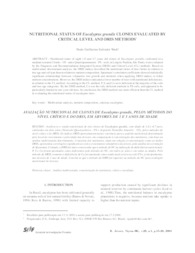Nutritional status of Eucalyptus grandis clones evaluated by critical level and DRIS methods.
Nutritional status of Eucalyptus grandis clones evaluated by critical level and DRIS methods.
Autoria: WADT, L. H. de O.
Resumo: Nutritional status of eight 1.0 and 4.7 years old clones of Eucalyptus grandis, cultivated in a medium textured Ustults - US - and a Quartzipsamments - PS - soils, in Lençóis Paulista, São Paulo, were evaluated by the Diagnosis and Recommendation Integrated System (DRIS) and Critical Level (CL) methods. Based on multivariate discriminant analysis, the DRIS indices described the nutritional status of trees better in relation to tree age and soil type than in relation to nutrient composition. Spearman's correlation coefficients showed statistically significant relationships between volumetric tree growth and nutrients when applying DRIS indices or foliar nutrient concentrations. However, the DRIS indices indicated a lower number of trees with nutritional deficiencies, in relation to the CL method. According to the CL method, P, S, and Ca were deficient in the majority of the soils and tree age categories. By the DRIS method, Ca was the only deficient nutrient in PS soils, and appeared to be particularly limited in one-year-old trees. In conclusion, the DRIS method was more efficient than the CL method in evaluating the nutritional status of eucalyptus trees.
Ano de publicação: 2004
Tipo de publicação: Artigo de periódico
Unidade: Embrapa Acre
Observações
1 - Por padrão são exibidas publicações dos últimos 20 anos. Para encontrar publicações mais antigas, configure o filtro ano de publicação, colocando o ano a partir do qual você deseja encontrar publicações. O filtro está na coluna da esquerda na busca acima.
2 - Para ler algumas publicações da Embrapa (apenas as que estão em formato ePub), é necessário ter, no celular ou computador, um desses softwares gratuitos. Sistemas Android: Google Play Livros; IOS: iBooks; Windows e Linux: software Calibre.
Acesse outras publicações
Acesse a Base de Dados da Pesquisa Agropecuária (BDPA) para consultar o acervo completo das bibliotecas da Embrapa.

